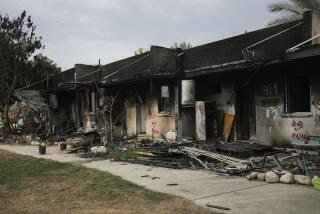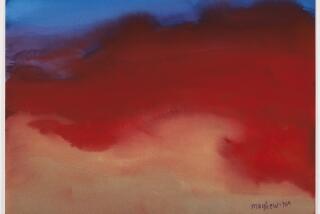Mining a Silver Vein
- Share via
As his compositions and piano playing were shaping jazz in the 1950s and ‘60s, it didn’t occur to Horace Silver he was doing anything monumental.
“In those years, I didn’t realize just what it meant,” Silver said from his Malibu home. “Sure, I always wanted to go down in history and do something important that would be remembered. But [when young] I never realized the importance my music would have.”
Didn’t realize his importance even as he recorded with Miles Davis in the early 1950s, creating a funky piano style that trumpeter Davis would champion throughout his career?
Not even as he formed the Jazz Messengers with drummer Art Blakey, coming up with the ensemble’s now-famous name as well as its trademark sound?
Not even as he wrote “Senor Blues,” “Song for My Father,” “Nica’s Dream,” “Doodlin’ ” and other now-standard jazz tunes that served as a foundation for the hard-bop movement and defined what came to be called jazz funk?
“Well,” the amiable Silver answered, “all those things bring it back to mind, make you reflect that all those years of hard work paid off. It’s good to know now that my music meant something to the world, that it brought entertainment and inspiration and a lot of good feeling.”
Silver’s accomplishments have been the subject of special focus recently. In 1999, Blue Note Records released a four-CD, 45-tune collection of his work, “Horace Silver Retrospective,” that covers 1952 to 1978. More recently, the composer-pianist figured prominently in documentarian Ken Burns’ all-too brief treatment of the post-bebop era in “Jazz.”
The USC jazz department’s major tribute to Silver comes to the Jazz Bakery in Los Angeles on April 2. A more intimate event to honor Silver will be held tonight at Vanilla’s Caffe in Orange, an affair the 72-year-old jazz legend promises to attend.
Although Silver, who watched all 10 episodes, praised Burns’ documentary, calling it a “Herculean effort,” he had a few criticisms.
“Though I thought it was very good, there were some people I would have liked to see get more attention: Nat Cole, Ahmad Jamal. . . . I would have liked to see Benny Carter and Gerald Wilson recognized. But I was glad he had me in there.”
Silver was raised with dual influences: the gospel music he heard at his mother’s church and the island sounds of his father’s homeland, Cape Verde.
“My father was Catholic, a Latin person, and he brought me up as a Catholic. But my mother--she died when I was 9--was a black Methodist, and I went to her church too. And I liked the music better there because it swung more, it was get-down-to-the-nitty-gritty type music.”
Silver began writing tunes when he was 15 and led his first trios for Sunday afternoon performances at Yale University near his hometown of Norwalk, Conn. “The first tune I ever wrote was called ‘Pierson Eyes’ for [Yale-associated] Pierson College,” he said.
In 1950, saxophonist Stan Getz joined Silver’s trio for a performance in Hartford, then asked the group to join him on the road. When Getz recorded later that year for the Roost label, he included three of Silver’s tunes, including “Potter’s Luck,” written for bassist Tommy Potter. They were the first of Silver’s tunes to be recorded.
Silver made his first Blue Note recording with saxophonist Lou Donaldson in 1952, and it led to a long association with the label. Such landmark recordings as the 1955 “Horace Silver and the Jazz Messengers” (which includes Silver’s classic jazz standard “The Preacher”), 1959’s “Blowin’ the Blues Away” and 1965’s “The Cape Verdean Blues” played a major role in creating the jazz-funk idiom that defined the Blue Note sound of the time.
Silver cites a number of favorite composers who weighed in on his writing.
“I was always into Bud Powell, Duke Ellington, Thelonious Monk and, of course, Dizzy [Gillespie] and Bird [Charlie Parker]. And there was Tadd Dameron, I really dug him. But I admired the Broadway composers as well: Irving Berlin, Jerome Kern, Harold Arlen, Cole Porter. They all wrote beautiful music.”
Sometimes, as in the case of “Song for My Father,” melodies came to him directly from experience. Silver’s father was Portuguese, hailing from the Cape Verdean isle of Maio. Silver remembers sitting on the steps of their home as a child listening to his father play folk music on guitar or violin.
“My father always wanted me to take one of those Cape Verdean songs and give it a jazz interpretation. But I never did it. They never reached me that much,” Silver said. “Then I went to Brazil and hung out with Sergio Mendes during Carnaval, and I got turned on to the bossa nova and tried to write something in that vein. I was using the bossa nova rhythm, but when I came up with the melody, it didn’t sound Brazilian; it sounded Cape Verdean.”
Silver continues to write music almost daily, though health problems--he spent time in the hospital in 1999 with blood clots in his lungs--have kept him from performing in public. His last recording was 1999’s “Jazz . . . Has . . . a Sense of Humor” for the Impulse/Verve label.
“I had to postpone one recording session in New York not long ago,” Silver said. “But I’m feeling much better now. I want to have the health thing completely taken care of before I start playing again.”
*
Irvine-based trumpeter Ron Stout said Silver has called a rehearsal for the same day as the Vanilla’s tribute.
“The great thing about getting to play with Horace is his childlike enthusiasm for what he’s doing,” said Stout, who’s been associated with Silver since 1992. “He’s just like a kid about the music. He brings a freshness and joy to everything he does.”
The organizer of the Vanilla’s event, bassist Luther Hughes, toured Europe with Silver in 1985.
“We started putting a list of Horace’s tunes together for the tribute, and it just kept growing and growing. There’s no way we could come close to covering all the important pieces he’s written.”
Besides Stout and Hughes, the tribute is scheduled to include Silver veterans Rickey Woodard on saxophone and drummer Carl Burnett.
SHOW TIME
A tribute to Horace Silver, tonight at Vanilla’s Caffe, 1948 N. Tustin Ave., Orange. 7:30-10:30 p.m. $5 cover, $10 minimum. (714) 921-8035.
More to Read
The biggest entertainment stories
Get our big stories about Hollywood, film, television, music, arts, culture and more right in your inbox as soon as they publish.
You may occasionally receive promotional content from the Los Angeles Times.










